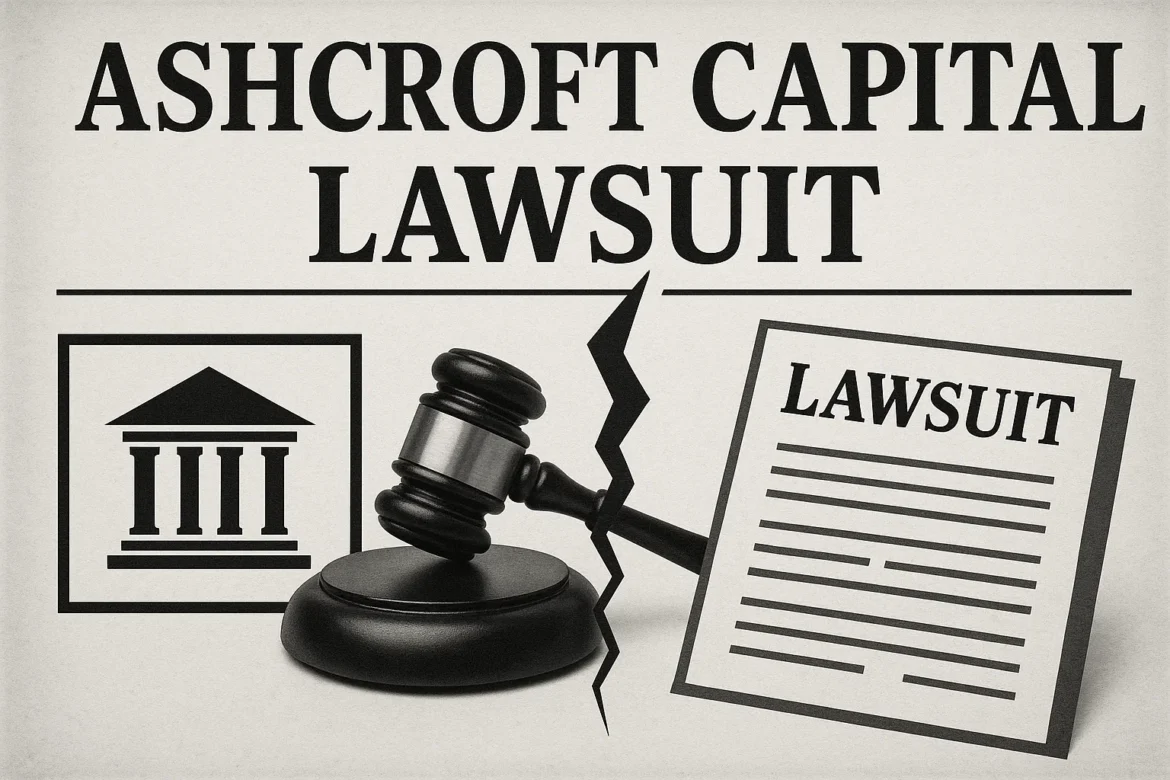
The real estate investment world often appears stable from the outside, but legal disputes can sometimes reveal the complexities beneath the surface. One such case is the ongoing discussion surrounding the Ashcroft Capital lawsuit. As a well-known real estate investment firm with a significant portfolio of multifamily properties, Ashcroft Capital has attracted both praise for its growth and scrutiny for its practices. Investors, potential partners, and those curious about the financial sector are eager to understand the details of the lawsuit, its implications, and how it might shape the company’s future.
Background of Ashcroft Capital
Ashcroft Capital was founded to become a premier multifamily real estate investment company in the United States. Known for its focus on Class B apartment communities, the firm positions itself as a leader in identifying undervalued properties and upgrading them to increase both appeal and profitability. With offices in key markets and a growing reputation, Ashcroft Capital has raised substantial amounts of money from investors.
Its leadership team, comprised of seasoned professionals, has cultivated trust over the years by promoting transparency and emphasizing investor returns. However, with visibility also comes scrutiny, and like many investment firms, Ashcroft Capital has not been immune to challenges. The Ashcroft Capital lawsuit represents one such challenge that has drawn attention from both industry insiders and the public.
Understanding the Ashcroft Capital Lawsuit
When discussing the Ashcroft Capital lawsuit, it is important to note that lawsuits involving real estate investment companies are not unusual. These disputes can stem from a variety of issues, including allegations of misrepresentation, disagreements with investors, contractual disputes, or regulatory compliance matters.
The lawsuit against Ashcroft Capital reportedly involves claims tied to investor relations and questions about how certain financial matters were handled. While the full scope of the case may not be public at the time of writing, the fact that litigation is underway has already sparked conversations about accountability in the investment world.
Why Lawsuits Happen in Real Estate Investment
To better understand the Ashcroft Capital lawsuit, one must first examine why lawsuits are common in this sector. Real estate investment firms operate in a highly complex environment, juggling property acquisitions, investor expectations, financial regulations, and market fluctuations.
Lawsuits can emerge due to:
-
Allegations of financial mismanagement.
-
Failure to deliver promised returns.
-
Breach of fiduciary duty.
-
Misrepresentation of investment opportunities.
-
Regulatory or compliance issues.
Given these factors, even companies with strong reputations can find themselves facing legal action. The lawsuit against Ashcroft Capital highlights how even well-regarded firms are vulnerable to disputes in such a demanding industry.
Investor Concerns and Reactions
One of the most significant aspects of the Ashcroft Capital lawsuit is how it affects investor confidence. Investors are the lifeblood of firms like Ashcroft, as they provide the capital necessary to acquire and renovate properties. A lawsuit often triggers concerns about whether funds have been used appropriately, whether returns are at risk, and whether management has been fully transparent.
In response, some investors may choose to wait for the legal process to unfold, while others may withdraw from future opportunities with the firm. The lawsuit could potentially influence how new investors view Ashcroft Capital, especially if the media coverage highlights negative claims.
Ashcroft Capital’s Response
Whenever a company faces a lawsuit, its public response is critical. Ashcroft Capital has aimed to maintain its reputation as a trustworthy investment partner, and this situation is no different. While details of the case remain under legal review, the company has emphasized its commitment to transparency, integrity, and the protection of investor interests.
By addressing concerns directly and showing a willingness to cooperate with legal proceedings, Ashcroft Capital seeks to minimize damage to its brand. The outcome of the Ashcroft Capital lawsuit will likely depend not only on the legal arguments but also on how effectively the firm manages its communications during this challenging time.
Legal Implications of the Lawsuit
 The Ashcroft Capital lawsuit could have several legal implications, both for the company itself and for the broader real estate investment sector. If allegations are proven, Ashcroft Capital may face financial penalties, restitution requirements, or even operational restrictions. Such outcomes could directly affect investors and employees.
The Ashcroft Capital lawsuit could have several legal implications, both for the company itself and for the broader real estate investment sector. If allegations are proven, Ashcroft Capital may face financial penalties, restitution requirements, or even operational restrictions. Such outcomes could directly affect investors and employees.
On the other hand, if the firm successfully defends itself, the lawsuit may be dismissed, and the company’s reputation could rebound. Regardless of the outcome, the lawsuit serves as a reminder that legal oversight plays a major role in protecting investors and ensuring accountability within the financial industry.
The Role of Due Diligence
One of the most important lessons from the Ashcroft Capital lawsuit is the role of due diligence. For investors, due diligence is not just a recommendation—it is a necessity. Before committing funds, investors must carefully review the firm’s history, past performance, financial reports, and legal track record.
Even highly reputable firms can face challenges, as this lawsuit illustrates. Conducting thorough due diligence helps investors reduce risk, ask the right questions, and understand potential vulnerabilities. The Ashcroft case underscores that no company is beyond scrutiny, regardless of size or reputation.
Impact on the Multifamily Real Estate Market
Ashcroft Capital is a major player in the multifamily real estate market, which means the lawsuit could ripple beyond the firm itself. If investors grow more cautious about working with Ashcroft or similar firms, funding for large apartment projects may slow down. This could affect housing availability, renovation timelines, and even rent prices in certain regions.
At the same time, competitors may see the Ashcroft Capital lawsuit as an opportunity to attract new investors seeking more stable alternatives. Thus, the legal proceedings against Ashcroft Capital could influence not only the company but also the wider market environment.
Media Coverage and Public Perception
The Ashcroft Capital lawsuit has attracted media coverage, which plays a vital role in shaping public perception. Headlines about lawsuits can often overshadow a company’s achievements, leaving investors and the general public with doubts about its reliability.
In today’s digital world, such news spreads rapidly, magnified by social media discussions and investor forums. Even if the lawsuit is resolved in Ashcroft Capital’s favor, lingering doubts may persist among those who only recall the initial reports. Managing public perception is, therefore, as critical as navigating the courtroom battle itself.
Potential Outcomes of the Ashcroft Capital Lawsuit
There are several possible outcomes in the Ashcroft Capital lawsuit:
-
Settlement – Many corporate lawsuits are resolved through settlement agreements, which may involve financial compensation or adjustments to business practices without an admission of wrongdoing.
-
Dismissal – If the claims are found to lack merit, the case may be dismissed, restoring confidence in Ashcroft Capital.
-
Court Ruling Against Ashcroft – If the court rules against the firm, the penalties could be substantial, affecting operations and investor relations.
-
Reputation Management Aftermath – Regardless of the legal result, Ashcroft Capital will need to engage in long-term reputation repair to assure investors of its stability and trustworthiness.
Lessons for Investors
For investors, the Ashcroft Capital lawsuit serves as a case study in risk management. Even in industries that seem stable, unexpected legal disputes can arise. Investors can learn several lessons, including:
-
Always diversify investments across multiple firms and sectors.
-
Stay informed about legal and financial developments concerning chosen investment partners.
-
Pay attention to transparency in communication from investment firms.
-
Recognize that lawsuits, while concerning, do not always indicate guilt but do highlight areas requiring scrutiny.
Broader Industry Implications
The Ashcroft Capital lawsuit is not just about one company—it reflects broader trends in real estate and finance. As more individuals turn to passive investment opportunities in multifamily properties, the potential for disputes grows. The industry is under increasing pressure to improve transparency, tighten compliance, and adopt better risk management strategies.
This lawsuit may ultimately encourage reforms within the real estate investment sector, prompting firms to revisit their practices and investors to demand higher levels of accountability.
Ashcroft Capital’s Future Outlook
The future of the Ashcroft Capital lawsuit depends on how the lawsuit unfolds and how the firm responds afterward. A favorable resolution could strengthen the company by demonstrating resilience and integrity under pressure. Conversely, a damaging outcome could hinder growth, reduce investor confidence, and open doors for competitors.
Either way, Ashcroft Capital will likely focus on rebuilding trust, improving communication, and demonstrating that it remains committed to creating long-term value in the real estate market.
Conclusion
The Ashcroft Capital lawsuit highlights the delicate balance between opportunity and risk in real estate investment. While Ashcroft Capital remains a significant player in the multifamily sector, this legal challenge underscores the importance of due diligence, investor awareness, and corporate accountability.
For investors, the lawsuit serves as a reminder that even established firms can face legal hurdles, and that vigilance is key to protecting financial interests. For the industry at large, the case emphasizes the need for greater transparency and stronger investor protections.
In the end, the Ashcroft Capital lawsuit is more than just a legal dispute—it is a pivotal moment that may shape how the company and the broader investment community approach growth, trust, and responsibility in the years ahead.
Also Read: HCOOCH CH2 H2O


